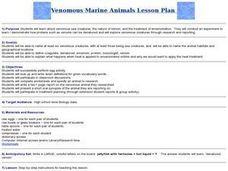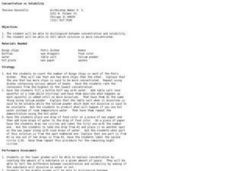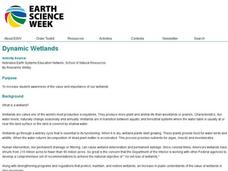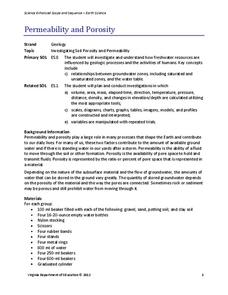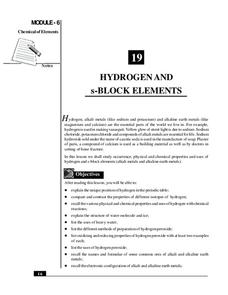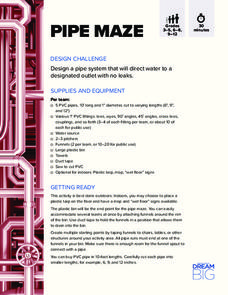Curated OER
Mass/Mass Problems
For this mass worksheet, students calculate how much of any product will form from a given amount of reactant. This worksheet has 7 problems to solve.
Curated OER
Venomous Marine Animals
Pupils name and describe six venomous marine animals. After participating in an activity, they define new vocabulary words. In groups, they complete worksheets to use while researching a specific venomous animal of their choice. They...
Curated OER
The Biosphere
In this biosphere learning exercise, learners identify the different levels of organization that ecologists study. Students complete charts, sentences, and answer short answer questions.
Curated OER
Concentration vs. Solubility
Students investigate the concentrations of solutions and solubility. For this concentrations and solubility lesson plan, students compare solutions of talcum powder in water and salt in water to have a visual of solubility. They perform...
Curated OER
Groundwater
In this groundwater activity, students use 12 given terms and match them to their definitions related to characteristics of groundwater and the components of the ground where the water travels. Students also fill in 5 blanks with given...
Curated OER
What is an Aquifer?
Students examine how an aquifer operates. They discuss the implications of the groundwater becoming contaminated. They work together to create an aquifer model to observe the connection between surface water and groundwater.
Curated OER
Dynamic Wetlands
High schoolers construct and observe a model of two different types of wetlands. In this wetlands lesson, students create a model of a wetland with constant drainage and a wetland that maintains a well-saturated soil. High schoolers...
Curated OER
Do You Drink It?
Students explore the aquifer. They create a model of an aquifer and explain how a well works. Students explore the relationship between a well and the water table. They explore the various ways that groundwater becomes contaminated.
Curated OER
How much Carbon Dioxide is in My Seltzer Water?
Students discover the law of conservation of mass though experimentation. In this chemistry lesson, students experiment with acid - base indicators to determine the presence of carbon dioxide. Students complete the labs with...
Curated OER
Periodic Table of the Elements
Middle schoolers experiment with transition metals. For this transition metals lesson students find the common properties of transition metals and conduct an experiment using one of them. Middle schoolers then answer...
Pennsylvania Department of Education
Determine Volume of Solids Using Water Displacement
Middle schoolers explore math functions by completing math equation worksheets. In this inequality activity, students define a list of math terms and discuss the difference between an equation and inequality. Middle schoolers utilize a...
Curated OER
Store to Table: Food Safety (Senior, other)
Students explore their role as food preparation specialists in the prevention of foodborne illness.
Curated OER
From the Farm to Your Table: Where Does Our Food Come From?
Learners discover where the food they eat comes from. Using maps, they identify the agricultural areas of the United States and the products that are grown in each area. Using the internet, they research how food gets to America from...
Curated OER
Table Placemats
For this desktop place mat worksheet, students refer to personalized resource sheets. The sheets include months, 3D shapes, 2D shapes, numbers, the alphabet, days of the week, and sight words.
Virginia Department of Education
Permeability and Porosity
Covering both permeability and porosity, scholars perform a hands-on experiment testing various soil types. The material includes a pre-lesson worksheet to help focus pupils on the task at hand.
Curated OER
Regents High School Examination: Physical Setting Earth Science 2010
Every topic under the sun is covered in this New York State Regents High School Examination. With the focus of earth science, participants answer 85 quesitons about the solar system, geologic time, rocks and minerals, landforms, and...
Curated OER
Regents High School Examination: Physical Setting Earth Science 2009
Junior geologists address 50 multiple choice questions and 35 short answer questions about the earth system. Plenty of visuals are included for interpretation: diagrams, graphs, maps, photographs, laboratory setups, weather symbols, and...
DiscoverE
Action Figure Diver
Will your next buoyancy lab rise to the occasion? Make a splash with action figure divers! Teams of young physicists explore the relationship between mass and buoyancy by adding weights or balloons to achieve a diver that neither sinks...
National Institute of Open Schooling
Hydrogen and s-Block Elements
Lesson 19 in the series of 36 analyzes the element hydrogen and the s-block elements. Through readings, answering questions, and discussion, learners write about and explain their occurrence, physical and chemical properties, and...
DiscoverE
Pipe Maze
Here's a lesson that is simply a-MAZE-ing! Introduce science scholars to pipeline systems through a hands-on project. Partnered pupils participate in the design, construct, and test a PVC pipeline maze. Reusable materials and clear...
NOAA
Tracking a Drifter
Be shore to use this drifter resource. The third installment of a five-part series has learners using the NOAA's Adopt-a-Drifter website to track to movement of a drifter (buoy) in the ocean. Graphing the collected data on a map allows...
Curated OER
Fracking: Positive or Negative Impact?
Your teenagers may have heard of fracking, but do they really know what it is? And could they debate the benefits and risks? Educate your environmental science class with a lesson about hydraulic fracturing, non-renewable energy...
BioEd Online
Gravity and Buoyancy
Would a baggie filled with water have the same shape sitting on a table as it would in a bucket of water? Why not? Allow learners to find out first-hand the effects of gravity acting alone on the baggie, as well as when gravity is...
Curated OER
Rate of Coral Growth
Using a table of information provided, middle school marine biologists chart data on a graph to determine the impact of water depth on coral growth in Australia's Great Barrier Reef. Then they answer questions that connect the data to...

